
Purpose-driven Work at Africa CDC: A Profile
Agnes Asele is on the frontlines of the battle against COVID, serving as a Project and Grants Management Technical Officer at Africa CDC. In celebration of Women's History Month, Elise Labott profiled her incredible contribution to the African continent.
Africa CDC has become indispensable in preventing disease and responding to emergency health crises in the last five years. The organization has taken the lead in helping coordinate the continent’s response to the COVID pandemic. Agnes plays a crucial role in providing oversight of various Africa Centres for Disease Control and Prevention in this role.
Agnes grew up in Eastern Uganda, along with her six siblings. Her mother and father were both teachers, and life wasn’t easy on their low salaries. But her parents worked hard and took on extra jobs to support the family.
“They always found extra ways to make money,” she remembers. “I learned from them that hard work pays off. That is something that, even at my age, I emulate. Sitting here at [Africa] CDC, there is still a possibility to do extra. What extra things can you do to enhance your ability to survive in today’s world?”
She learned from her parents that education was the key to the future. And she took it seriously.
“When you see the level I am today, it is because I emulated what both my parents were doing,” she says.

Her dream was to go to university and begin her studies at Makerere University, where she earned a Bachelor's degree.
That was just the beginning. The foundation of the importance of education was instilled in her by her parents. Inspired Agnes to earn many degrees. She holds a BA in Entrepreneurship and Business Management, a Masters in Management and Sustainable Economic Development, a Masters in Jurisprudence, and Masters in International Cooperation and Humanitarian Aid.
She says each degree taught her different skills. Learning about responsive management and sustainable economic development helped learn management resources to success in her organization’s objective and missions. Her entrepreneurship and business management studies taught her to build capacity and think creatively in her projects.
“I felt like I needed to diversify myself quite a lot,” she says. While she was working at the African Union, she took advantage of the opportunity to get a law degree, which was fully funded by the AU, because she thought it was important to get legal skills. Doing humanitarian work and working with funding partners during the Ebola breakout inspired her to get yet another agreement in humanitarian aid and international development to study the nexus between emergency management and partnership coordination.
“The way I look at it, if, as long as I have an opportunity to enhance my skill, I would always do that,” she says “As much as I keep myself busy with my work and am committed to my work, I also go the extra mile just to enhance my skills.”
She joined the African Union in 2014 to support the Ebola outbreak in West Africa and helped establish the Africa CDC and coordinate various management activities before joining the Africa CDC.
Agnes says the key to managing projects is coordination – and says keeping an updated database is among the most important ways to stay on top of everything.
She says when a response starts to take shape and members are getting what they need, she feels good about the impact she is making at the African CDC.
“The most rewarding thing is when you mobilize resources and are able to use resources to serve a purpose,” she says. ''Once that process is achieved, I feel like, okay, this is a success.”

She finds the biggest challenges in her job are keeping the systems current to address emergency response and navigating bureaucratic tape
“If you are waiting for a month or two to achieve something, it’s hard to assure an immediate response. Some of these things demotivate you.” She says preparation and teamwork are key to coordination, and “then you just have to push, and push and push to get results.”
COVID has been an incredibly stressful time for Agnes and her team at Africa CDC. Even though the staff has increased, the demand is so great. Multi-tasking is the name of the game.
Agnes says she and her colleagues learned a lot during the Ebola outbreak on the content that helped them fight COVID.
“The difference between the two outbreaks were different and Ebola was just in West Africa alone. But the Ebola experience did prepare us and set a foundation of how to deal with a pandemic,” she says. “I also think the coordination within the countries themselves during Ebola helped. Countries seemed like they were prepared for anything.”
Agnes said seeing the rate COVID spread through Europe and the potential to impact the Africa continent also mentally prepared leaders.
“Africans themselves were also mentally prepared. that if we do not deal with this, we are all doomed as a continent. That impact alone was able to really motivate citizens to say, okay we need to take the measures the government is taking in place seriously. After seeing what the pandemic did to the West, citizens were committed.
Agnes says Africa CDC leverages those lessons, along with the databases set up by the African Union during Ebola to seize the advantage against COVID and build rapport among African states while responding to different outbreaks.
“When you're looking at a public health organ as young as the Africa CDC, I feel like it has really achieved a lot,” she says. “In collaboration with all these key stakeholders, the fact that Africa CDC is also now able to really be a voice on behalf of the continent to negotiate for some of these policies, either talking about vaccines in equity or financing shows it has pulled up its socks to be able to succeed.”
Because Africa has received a pitifully small percentage of the global vaccine supply, Agnes says now is a good time to get Africa CDC member states to commit to increasing their health financing.
“How do we ensure they beef up? How do we build back better,” she asks. “How do we develop our infrastructure for the next shock, a global shock? So that we are prepared for the next pandemic? We are not yet there, but it's a process.”
COVID, she says, has taught Africa that they need to focus on doing things for themselves, like manufacturing their own vaccines.
“COVID 19 really had a global impact on all of us. Africans have to say, ‘we are not going to rely on just external funding.’ We also need to find ways of mobilizing resources internally here,” she says. “We need to stretch through the health sector to the private sector to see how the private sector can help stand with the continent.”

With Africa having the largest youth population globally, Agnes says the continent is poised for the future. But she says it’s important to ensure they have the digital and technological skills they need to be enhanced.
“I see it as youth in Africa really have a very big potential, but they need to be empowered, '' she says.
The same goes for empowering women.
“You know the saying, ‘educate the world.’ For me it’s very important that women, the youth do get that opportunity to enhance their skills at whatever cost it's, that is really very important.”
She also says it is important to ensure that gender consciousness must be a factor of all programs.
“Once you say you are implementing a program, and if it's limited to a certain group of people, then it becomes an issue. But having policies and programs that are sensitive to issues of gender bias would be a success in any organization in implementing its activities.”
Even after all she has done, Agnes says her commitment and future lies with Africa CDC.
“We don't know what will come in terms of public health safety on the content. And we have a long way to go in terms of building our own health systems - to strengthen them, to be resilient, to any kind of pandemic that might come in the near future, she said. “I want to believe that it's a continental organ that has very good potential. Africa CDC really has become a very respected organ within the continent. It's only, it's only five years young, but then it has made a great impact within the continent and will grow.”
The Africa Centre for Disease Control and Prevention is celebrating its fifth anniversary. Africa CDC is a specialized technical institution of the African Union established to support public health initiatives of Member States and strengthen the capacity of their public health institutions to detect, prevent, control and respond quickly and effectively to disease threats.
Elise Labott is a professor at American University School of International Service and the CEO/Founder of Zivvy Media.

